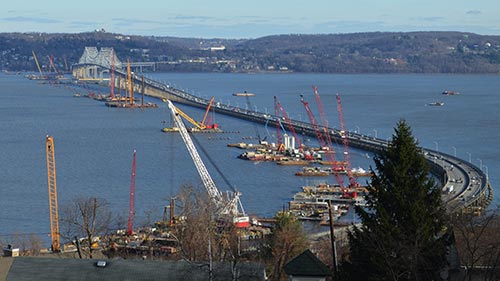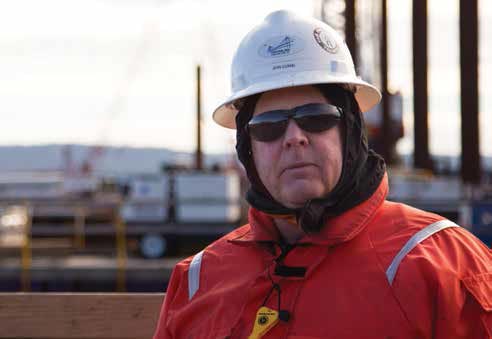Tappan Zee Constructors is requiring CCO certification for operators and riggers
January 2015—The $3.9 billion replacement of the aging Tappan Zee Bridge, one of the largest infrastructure projects in North America, is benefiting from the risk mitigation and enhanced safety provided by CCO certification. Tappan Zee Constructors, LLC, (TZC), a consortium of four contracting companies, is requiring all riggers and operators working the project’s more than 30 cranes to be certified through the National Commission for the Certification of Crane Operators (NCCCO).
Following dredging and preliminary work, permanent construction operations on the three-mile twin bridge that spans New York’s Hudson River began in October 2013. The job site is a buzzing hive of activity, with up to 500 workers on site at any one time.

Safety and expertise are paramount priorities for the enormous and complex project. With some 6,000 pieces of rigging equipment and 55 rigging crews working with an armada of cranes that lift from sun up to sun down, there is no room for error.
John Glinski, safety manager of cranes and rigging for TZC, said that in the initial planning stages of the project, he recognized that all crane operators and riggers needed to be NCCCO certified. He had several reasons, chief among them safety, expertise and training.
“New York requires a state certification for crane operation and rigging, but for us it isn’t enough,” he explained. “We require CCO certification because we want to be sure we have the safest, most experienced operators on our job site. This certification proves to us that the operators and riggers have a high level of expertise.”

“We require CCO certification because we want to be sure we have the safest, most experienced operators on our job site. I absolutely feel we’re getting a better quality person when they’re CCO certified,” said John Glinski, TZC Safety Manager of Cranes & Rigging.
Glinski, who is also safety manager at Fluor, one of the four companies comprising the consortium, proposed to the project’s board of trustees that the venture require NCCCO certification. The response was a firm “yes” for several reasons:
- CCO certification ensures a safer job site
- CCO certification mitigates risk, in turn, lowering insurance costs
- CCO-certified personnel have shown to be more efficient than their non- certified counterparts
- CCO-certified personnel have greater command of their equipment, which lessens maintenance and repair costs
“I absolutely feel we’re getting a better quality person when they’re CCO- certified,” Glinski explained. “There are plenty of operators and riggers with licenses, but they just don’t all rise to the same level. With CCO-certified guys, they know more about the work they’re doing, they’re faster, they’re less likely to make a mistake, and they’re much easier on the equipment.”
Among the host of equipment on the job are cranes from Liebherr, Link-Belt, Manitowoc, Tadano, and Terex. They represent a mix of crawler, tower, and mobile cranes; some cranes are mounted on barges while others are pedestal-mounted. Glinski said CCO certification ensures that all of the operators and riggers share a common base knowledge and skill level across crane models, bringing uniformity to the site and its operations.
The CCO certification requirement has also lowered insurance costs for the consortium. Insurance fees on a project of this magnitude can make up a significant portion of the project’s cost, both to the company, and in this case, taxpayers.
Though it may be hard to quantify the dollar figure because insurance premiums come as part of a larger audit, TZC said the CCO certification requirement “absolutely” has lowered costs.
TZC is paying for both rigger training and the fees associated with the CCO written certification exams for NCCCO Rigger Level I. The riggers pay only for the practical exam. The response has been “overwhelming,” according to Glinski, as dozens of employees have been certified through the process.
After more than a year of construction, the job site has remained accident free and has run with remarkable efficiency. Glinski is positive that the CCO-certification requirement has helped ensure a safe and efficient working zone, not to mention the time and money saved with his crew of expert lifters. In fact, according to the U.S. Bureau of Labor and Statistics, certification and training bring back $4 for every dollar spent. A 400 percent ROI is good business in anybody’s book.